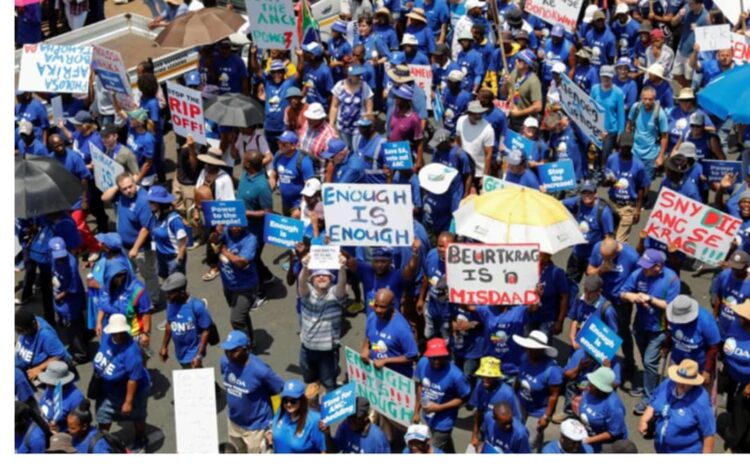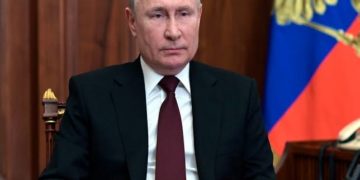A popular political analyst and social commentator, René Kassavugu, has further speak out on the recent happenings in South Africa, especially as they relate to the involvement of Democratic Alliance (D.A).
First on his list of query was the recent video featuring racist remarks from members of the party.
According to Kassavugu, a brief video featuring racist remarks made by members of the DA has recently begun to circulate on social media.
He further revealed that, “the clip includes comments from DA parliamentarian Mlindi Nhanha and the party leader, John Steenhuisen, sparking widespread controversy due to its racial implications. In his speech during the State of the Nation Address (Sona), Nhanha suggested that apartheid wasn’t entirely negative, crediting it with leaving behind strong and operational state-owned enterprises in South Africa. He later asserted that the government’s shortcomings reinforce the prejudiced belief that black individuals are incapable of governing, predicting that South Africa is on its way to becoming a typical failed state.
“The Democratic Alliance (DA) is enveloped in a myriad of racial controversies that question its commitment to a post-apartheid, inclusive society. As South Africa gears up for the 2024 national elections, the spotlight on the DA’s racial dynamics has intensified, exposing a series of incidents and comments by its members that have sparked widespread criticism and debate.”
Going historically, he said, “The DA’s perceived identity crisis, particularly among black South Africans, can be traced back to its origins and the political legacies it carries. The party, described by critics as a refuge for former National Party members after apartheid, has struggled to shake off the image that it primarily serves the interests of the white minority.”
Looking at other alleged act of racism in the party, the analysts said, “The DA’s internal and public controversies have frequently made headlines, each incident painting a picture of a party at odds with the nation’s aspirations for racial harmony:
“In a notorious case, Penny Sparrow, a DA member, referred to black beachgoers as “monkeys” in a 2016 Facebook post. This comment sparked national outrage and led to widespread condemnation, highlighting the racial prejudices still present within some party members. In a more recent controversy, John Steenhuisen, the DA’s leader, faced backlash for his remarks regarding traditional healers, suggesting they should be “shot” in a manner reminiscent of hate speech. This comment, made by Steenhuisen at a DA event in February 2024, was condemned by traditional healers and others as insensitive and reflective of a disregard for indigenous practices and racial sensitivity.
“The DA’s engagement with racial issues has also been marked by other problematic statements and actions by its members. For instance, DA councillor Connie Hariram questioned the election of a black South African woman to a ward committee in a voice note shared on WhatsApp, raising concerns about racial bias in community representation. In a highly publicized incident, the DA suspended Nqaba Bhanga, after criticizing Helen Zille, a prominent DA figure, as “the most racist person” on social media. This episode in 2023 not only highlighted internal divisions but also brought to the fore the allegations of racism within the party’s ranks. The DA’s racial controversies extend beyond its leadership.”
Querying further, he said, “Each of these incidents has contributed to a growing narrative that the DA struggles with racism within its ranks, impacting its public image and electoral prospects. The backlash from these controversies has not only come from the public and political opponents but has also sparked introspection within the party. The DA’s leadership has not adequately addressed these incidents, contributing to a perception of tacit acceptance or insufficient commitment to rooting out racism.
He further advised the party that, “As South Africa approaches a critical juncture in its democratic journey, the DA’s handling of racial controversies remains a focal point of scrutiny. The party’s challenge is not only to confront and rectify these issues internally but also to demonstrate to the electorate its commitment to representing and advocating for a racially inclusive South Africa. This involves not only public apologies and disciplinary actions but a profound reassessment of its policies, leadership diversity, and engagement with communities across racial lines.
“For a nation still healing from the scars of apartheid, the demand for political parties to embody the principles of unity, equality, and justice remains non-negotiable. The DA’s journey towards these ideals is watched closely by voters, who seek not just political rhetoric but tangible actions that reflect a genuine commitment to overcoming South Africa’s racial divides.”











